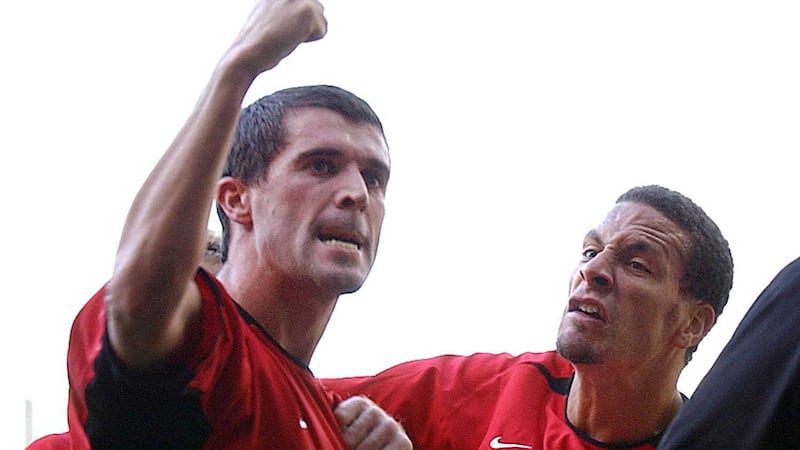WHEN Alex Ferguson makes the news these days, it’s usually because he’s another autobiography out. How many autobiographies can one man write in a lifetime?
The latest instalment is entitled Leading. A lot of the media have latched onto the former Manchester United manager's claim in the book that he only had four world class players during his time at Old Trafford: Ryan Giggs, Paul Scholes, Cristiano Ronaldo and Eric Cantona. Scholes and Ronaldo I can agree with, but Cantona and Giggs?
Ranking players has always been a subjective exercise. Clearly, though, Ferguson has taken subjectivity to its absolute outer limits with his choices. Some may even disagree with Scholes being regarded as 'world class' because his international career was no more than above average. Nevertheless, given his influence at Old Trafford for close to two decades, it would seem slightly churlish to exclude him.
Giggs, one can only assume, makes Ferguson's four-strong list for his longevity more than anything else. On his day, Giggs was electrifying. But that was exactly the Welsh international's problem - he didn't have enough good days to be deemed anywhere near the world class category. The argument against Giggs was always his lack of consistency in the early-to-middle part of his career.
Of course, being consistently good on the wing is more difficult to attain than, say, a central midfielder’s role or a full-back's role, mainly because the margin for error for a winger is greater because they play in an area of the field where possession of the ball is most at risk. For a winger, Giggs' crossing was often poor and he squandered possession far too easily in games. It was only when he moved in from the wing in the autumnal stages of his career that Giggs became a more consistent performer at United.
Growing up, I loved watching Eric Cantona play for United. I loved everything about the Frenchman. His upright gait made him look the most elegant footballer ever to play the game. Collars flicked upwards, Cantona didn't so much as touch the ball, he caressed it. He had a wonderful appreciation of space on the field and nearly always gave the right pass.
Cantona scored all kinds of goals, too. Little wonder Ferguson rated him so highly as he was the catalyst that enabled United to dominate English football during the 1990s. However, the reservations surrounding Cantona's world class credentials are familiar ones. His performances in Europe for United were generally disappointing and he had a mediocre international career.
But it was the players who weren’t included in Ferguson’s ‘world class’ list that provoked more debate. It’s inexplicable how Roy Keane and Peter Schmeichel were not included by Ferguson. Both Keane and Schmeichel were leaders who were the backbone of successful United teams. Crucially, they dictated the outcome of many games.
At the peak of their powers, there was no better central midfielder than Keane and Schmeichel was already an all-time great. And unlike Giggs, Cantona and, to a lesser extent, Scholes, Keane and Schmeichel replicated their club form on the international stage.
Moreover, Ferguson displays a curious sense of what constitutes world class in the modern game. For instance, he suggests there are really only two players worthy of the description - Ronaldo and Lionel Messi. It’s undoubtedly true there are many functional players in the top leagues in Europe, but contrary to Ferguson’s musings, there are more than two world class footballers in today’s game.
Luka Modric at Real Madrid is the complete midfield player and easily fits the world class tag. Surveying Andres Iniesta's career and not considering the Spanish international to be world class is astonishing. Luis Suarez is the most devastating striker in world football. Javier Mascherano was the best player at last summer's World Cup finals in Brazil.
Sergio Busquets has been central to Barcelona's success. Jordi Alba and Philipp Lamh are world class in most people's eyes. Over the last 12 months, it's impossible to deny Neymar's graduation to world class status. Likewise, Colombia's James Rodriguez. Manuel Neuer is the best goalkeeper since Iker Casillas. Dutch international Arjen Robben is another that can't easily be dismissed from football's hall of fame. All these players are modern greats of the game and would grace any team.
So when you consider some of these names which Fergie doesn’t deem world class, you wonder is there any wisdom or insight contained in any of the pages of his new book?
FORTY years ago this week, the boxing world witnessed one of the most epic duels ever to take place in a boxing ring.
On October 1 1975, Muhammad Ali’s third and final bout with Smokin’ Joe Frazier – known as The Thrilla in Manilla – was as brutal as it was enthralling. Both men were some years past their best, but what they served up in 14 rounds of unremitting skill and courage easily ranks in the top five of all-time great fights.
Ali and Frazier, bitter rivals throughout their heavyweight careers, shared one victory each before their 1975 meeting in the searing heat of Manilla. In round 14, at the end of which trainer Eddie Futch pulled Frazier out of the fight, both men were fighting on memory alone. Indeed, those three minutes were the greatest illustration of human courage in a sporting context.
When the fight was waved over, Ali didn’t have the energy to celebrate his victory. Slumped on his stool in the middle of the ring, referee Carlos Padilla raised his limp arm. Ali would later add that rounds 13 and 14 were the closest thing to dying.
In the words of legendary boxing journalist Hugh McIlvanney, Frazier displayed “aggression insistent as fire”. As Ali left the ring, McIlvanney observed: “His face had the greyness of terminal exhaustion and he moved as if the marrow of his bones had been replaced by mercury.”








